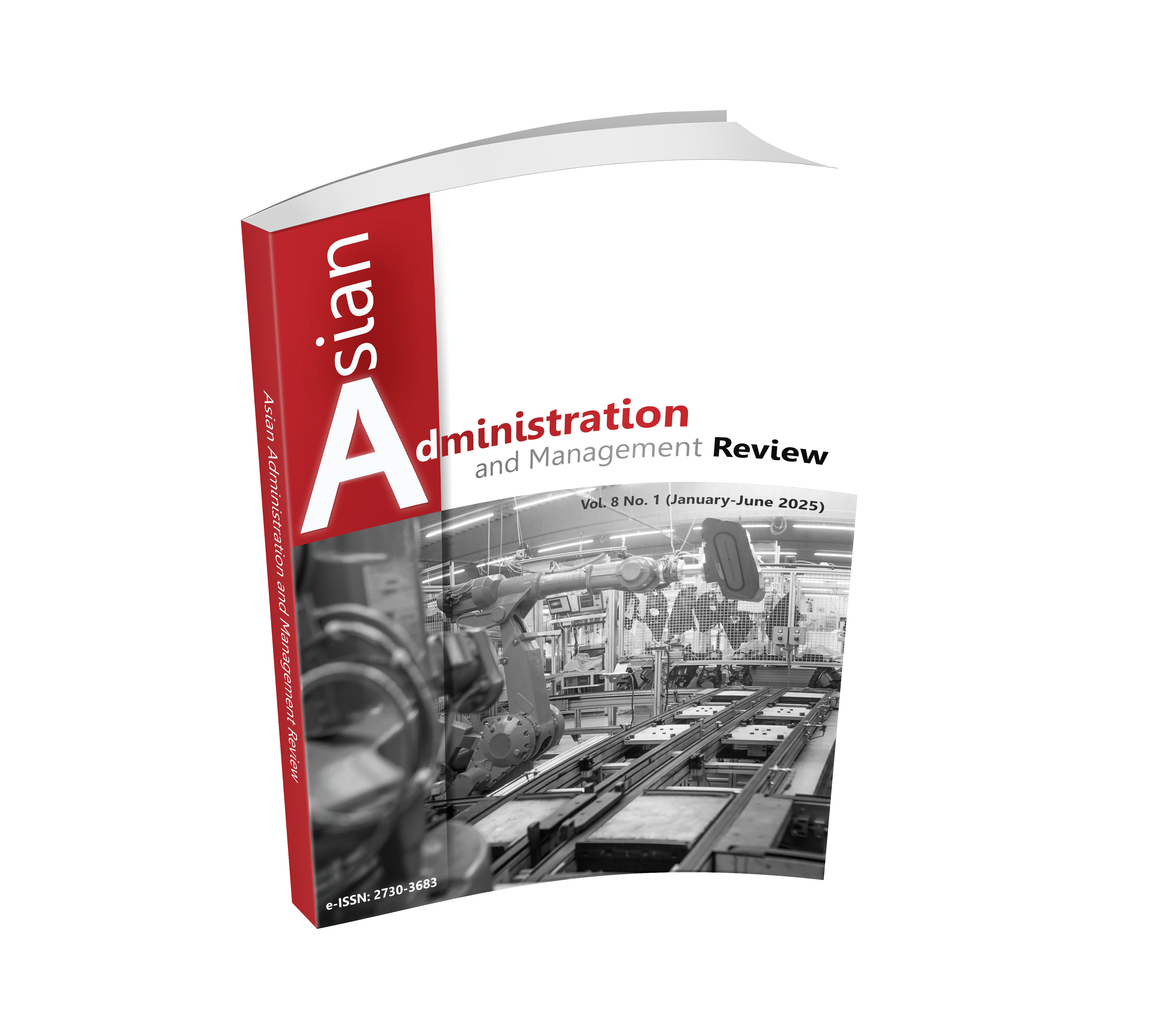THE INFLUENCE OF NATIONAL CULTURAL DIMENSIONS ON THE BUSINESS OPERATIONS OF MUSLIM ENTREPRENEURS IN CHIANG MAI, THAILAND
DOI:
https://doi.org/10.14456/aamr.2025.6Keywords:
National Cultural Dimensions, Business Performance, Muslim EntrepreneursAbstract
This research examines the national cultural dimensions that influence the business operations of Muslim entrepreneurs in Chiang Mai, Thailand. The study employs Confirmatory Factor Analysis and synthesizes the model using the Multiple Indicators Multiple Causes Model with the AMOS software. The unit of analysis consists of 321 Muslim entrepreneurs in Mueang Chiang Mai. It was found that Muslim entrepreneurs in Chiang Mai place the highest importance on organizational learning and growth. Internal processes rank second, followed by business performance and customer-related factors. The cultural dimension factors affecting business performance, ranked by total path coefficients, are masculinity and femininity, time orientation in work and life, individualism and collectivism, and power distance. The cultural dimension of Uncertainty avoidance had no significant effect on business operations. The qualitative research indicated that all cultural dimension factors impact business performance, which differs from the quantitative findings. The study’s recommendations include promoting gender equality in the workplace, developing time management training programs, creating mechanisms to support adaptability to uncertainty, and enhancing cultural understanding in business management. These will enhance the capabilities of Muslim businesses in Chiang Mai and foster a conducive environment for long-term development and sustainability.
Downloads
References
Aree, A., Jamjumrus, T., & Konglua, D. (2019). The Antecedents Affecting the Development of Halal Tourism Industry in Chiang Mai Province. Journal of MCU Nakhondhat, 6(10), 5802-5820.
Bellostas, A., Río, C., González-Álvarez, K., & López-Arceiz, F. (2023). Cultural context, organizational performance, and Sustainable Development Goals: A pending task. Green Finance, 5(2), 211-239.
Boonyaratnapan, S. (2014). Research Methodology for Public Administration. 14th ed. Bangkok: National Institute of Development Administration.
Carolina, T. (2019). Dimensions of National Culture - Cross-Cultural Theories. Studies in Business and Economics, 14(3), 220-230.
Cullen, J., & Parboteeah, K. (2008). Multinational Management: A Strategic Approach. 4th ed. California: Thomson Higher Education.
Gorodnichenko, Y., & Roland, G. (2011). Which Dimensions of Culture Matter for Long-Run Growth?. American Economic Review, 101(3), 492-498.
Hammou, K., Galib, H., Steiger, J., & Mellou, J. (2014). The Effect of National Culture on Strategic Behavior and Financial Performance: Evidence from the Cement Industry in Morocco and the United States of America. Journal of Management and Research, 6(1), 70-90.
Hofstede, G. (2008). Research and VSM. Retrieved from https://geerthofstede.com/research-and-vsm/vsm-08/.
Hofstede, G., & Minkov, M. (2013). Values Survey Module 2013 Manual. Retrieved fromh ttps://geerthofstede.com/research-and-vsm/vsm- 2013/.
Hofstede, G., Hofstede, G., & Minkov, M. (2010). Cultures and Organizations: Software of the Mind. 3rd ed. New York: McGraw Hill.
Hsieh, A., & Tsai, C. (2009). Does national culture really matter? Hotel service perceptions by Taiwan and American tourists. International Journal of Culture, Tourism and Hospitality Research, 3(1), 54-69.
Kaiyawan, Y., & Palaprom, K. (2010). Research Fundamentals. 5th ed. Bangkok: Bangkok Supplementary Media Center.
Kaplan, R., & Norton, D. (1996). Strategic Learning & the Balanced Scorecard. Strategy & Leadership, 24(5), 18-24.
Kline, R. (2005). Principles and Practice of Structural Equation Modeling. 2nd ed. New York: Guilford Press.
Kongsawatkiat, K. (2009). Business Research Methodology. Bangkok: Pearson Education Indochina.
Merriam, S. (2009). Qualitative Research: A Guide to Design and Implementation. New Jersey: Jossey-Bass.
Pérez-Cornejo, C., de Quevedo-Puente, E., & Delgado-García, J. (2023). The role of national culture as a lens for stakeholder evaluation of corporate social performance and its effect on corporate reputation. Business Research Quarterly, 26(4), 282-296.
Podhisita, C. (2005). The Art and Science of Qualitative Research. 4th ed. Amarin Printing and Publishing.
Rompho, N. (2010). Performance Measurement Practices in Thai SMEs: The Balanced Scorecard Perspectives. Bangkok: Imagineering Group.
Rujirawanich, P., Addison, R., & Smallman, C. (2011). The effects of cultural factors on innovation in a Thai SME. Management Research Review, 34(12), 1264-1279.
Steers, R., Sanchez-Runde, C., & Nardon, L. (2010). Management Across Cultures: Challenges and Strategies. Cambridge: Cambridge University Press.
Tanaka, J., & Huba, G. (1989). A general coefficient of determination for covariance structure models under arbitrary GLS estimation. British Journal of Mathematical and Statistical Psychology, 42(2), 233-239.
Thongbai, K. (2006). Business Strategies and Policies. 5th ed. Nonthaburi: Sukhothai Thammathirat Open University Press.
Traimongkolkul, P., & Chattaporn, S. (2000). Research Design. 3rd ed. Bangkok: Kasetsart University Press.
Trompenaars, F., & Hampden-Turner, C. (2000). Riding the Waves of Culture: Understanding Cultural Diversity in Business. London: Nicholas Brealey Publishing.
Wang, J., & Wang, X. (eds.). (2012). Structural Equation Modeling: Applications Using Mplus. New Jersey: John Wiley & Sons.

Downloads
Published
How to Cite
Issue
Section
License
Copyright (c) 2025 Authors

This work is licensed under a Creative Commons Attribution-NonCommercial-NoDerivatives 4.0 International License.











.png)


